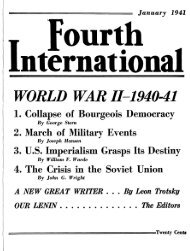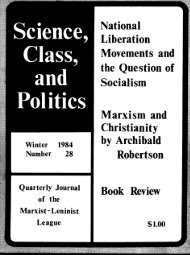Volume 6, No. 2, June, 1918
Volume 6, No. 2, June, 1918
Volume 6, No. 2, June, 1918
You also want an ePaper? Increase the reach of your titles
YUMPU automatically turns print PDFs into web optimized ePapers that Google loves.
The Internationalist Page nineteen<br />
God. We are cells in that spiritual organism which Jesus<br />
called "The Kingdom." Of course, we understand that Dr.<br />
Jefferson is not talking about the Kingdom of God, or the Republic<br />
of God, whichever title we give to it, but rather of the<br />
American Republic. <strong>No</strong>w while it is true that we are members<br />
also of this American Republic, it seem to us that Dr. Jefferson<br />
will have to admit that our first loyalty is to the heavenly<br />
Kingdom, not to the earthly. For us the law of Christ is above<br />
every law, and the loyalty to his kingdom above every loyalty.<br />
Furthermore, the heavenly Kingdom is one which knows<br />
nothing of the barrier represented by nationalism. There is a<br />
stronger tie than that of a common birthplace; it is the tie of<br />
a common spiritual experience by which men are made citizens<br />
of the Kingdom of Brotherly Love. Neither language,<br />
nor color, nor education, nor birthplace, serve to separate<br />
men who Lelong to this spiritual Kingdom.<br />
As for the biological analogy, that we "are cells of a great<br />
organism," it is only true in a limited sense when applied to the<br />
relation of the individual to the state. Apparently the real<br />
difference of opinion here is as to whether as Christian men<br />
our first responsibility is to obey the will of God as we understand<br />
it individually, or, to fall in with the judgment of the<br />
social group when the two conflict as at the present time.<br />
the writer it seems as though Jesus<br />
approaches the whole problem of life<br />
as primarily that of the relation of the<br />
individual soul to God. His chief concern<br />
was to get men to live the filial<br />
life as children of their Heavenly<br />
Father. His teaching has large social<br />
implications and consequences, but it<br />
is individual in its approach. Hence<br />
the fundamental loyalty of a Christian<br />
man even in time of war is not to the<br />
social group of which he is a member,<br />
but to God.<br />
Dr. Raymond C. Brooks of The<br />
First Congregational Church of Berkeley,<br />
California, has expressed practically<br />
the same attitude as Dr. Jefferson's<br />
in the words, "whether we<br />
think the initial step was wise or unwise<br />
(that is entering into the war) we<br />
are now in it, and we must therefore<br />
meet as wisely and as manly as possible the responsibility for<br />
what has been done." To that the pacifist will say, "We believe<br />
in co-operating with our government when it is standing<br />
for the right, but when that government deliberately decides<br />
through those who are in control to enter upon a course of<br />
action which is wrong, then we can best be true to our country,<br />
and can best meet our responsibility as Christian citizens<br />
by persistently doing the right, refusing at the same time to<br />
have part or iot in<br />
the wrong course which the government is<br />
taking." Our first duty is to God, not to the government. The<br />
fundamental responsibility is not the social, but the individual.<br />
We believe in no government which attempts to coerce the<br />
consciences of its citizens. Government of that sort is of the<br />
essence of what some have called<br />
"Kaiserism."<br />
In conclusion, then, it seems to the pacifists of the country<br />
that it ought to be evident to anyone who trusts to spiritual<br />
values, and to spiritual forces, as supreme that we shall never<br />
conquer the ideals for which some of our enemies seem to<br />
stand by stooping to their own vicious methods. Furthermore,<br />
we believe that the Christian method which has been suggested<br />
is one whereby we shall "more surely protect and defend the<br />
To<br />
ideals which are our common possession," even though edherence<br />
to it may mean that for the present our service must<br />
be accomplished through the smaller group, the minority,<br />
rather than through co-operation with the majority in carrying<br />
out the program of the government. We shall endeavor to<br />
avoid any spirit of intolerance toward those who believe that<br />
a Christian program for the present necessitates participation<br />
in the prosecution of the war; but as for ourselves, we cannot<br />
believe that God requires us to assist in defending either<br />
His truth or His people by a method which involves, from our<br />
standpoint, such an entire "moral surrender" of the whole<br />
Christian position.<br />
1~\R. EDWARD A. STEINER said<br />
^^ recently in the "Outlook":<br />
"I am fearing for the future of our<br />
country, not the present. We are<br />
in<br />
danger of being controlled by a<br />
Prussian cast of mind;<br />
we are fast<br />
becoming that which we are fighting,<br />
and the alien born are finding<br />
themselves in<br />
the midst of the very<br />
conditions from which they fled."<br />
Apocalypse<br />
Today my boss died.<br />
They say it was apoplexy.<br />
That's why I'm here, lying in<br />
Stunned and trembling at the wonder<br />
Of these new-born things,<br />
These violets and these buttercups<br />
That stare at me so silently.<br />
the grass,<br />
I had forgotten that there ever was a Spring,<br />
And tender leaves and yielding earth<br />
And birds that sing with joy;<br />
And it<br />
I've lived so long where there are only<br />
grinding wheels<br />
And cold, unliving cobblestones.<br />
This morning, when they stopped the<br />
wheels because he died,<br />
And closed the doors out of respect<br />
for him,<br />
The unexpected freedom only left me<br />
dazed.<br />
I could not believe that it was Wednesday,<br />
And I outside the doors with idle<br />
hands,<br />
While all around, the world rushed on<br />
with working.<br />
I felt so lost and useless and alone.<br />
Of what good was it to be not work-<br />
And then ,unthinkingly, I took a car<br />
brought me out here.<br />
Three hours I've Iain here in the grass— just resting,<br />
Thinking what I thought of long ago,<br />
Before I grew too tired,<br />
Feeling what is too beautiful to feel in wearniness:<br />
For three whole hours I have been alive!<br />
It is queer—but grimly true . . .<br />
Because a fat man fed his body over-much<br />
.And choked his mean and scrubby soul,<br />
I have a day of freedom . . .<br />
And if I said what I feel lying here,<br />
Remembering what it means to be alive,<br />
With the warm earth stirring under me,<br />
I'd say I'm glad—I'm glad he died . . .<br />
—ELEANOR WENTWORTH.<br />
"There has not been a better thing done in this country, in my opinion,<br />
than the establishment of co-operation of which Lancashire deserves the<br />
principal credit."—WILLIAM E. GLADSTONE.
















